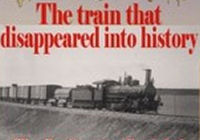SPOREN VAN BERLIJN NAAR BAGDAD

Wat Kathie Somerwil-Ayrton schreef over de Berlijn-Bagdad spoorweg, geldt ook voor de geschiedenis van het hele Europese en Afrikaanse continent: To write about this railway is to write about the impossibility of the Great Powers to act in concert, not only for their own national good, but alo for the good of Europe as a whole. This was as true then as it is true today. To give credit where credit is due, the Germans at least developed the conception of an artery connecting the various countries in the two continents to bring prosperity to all. They originally envisaged general European participation ( ) France found the financial advantages too tempting and on 15 February 1914 signed a belated and secret treaty with Germany with regard to participation (Somerwil, 275).
Met dwangarbeid werd de spoorlijn versneld afgewerkt in 1916, maar de chaos als gevolg van de Armeense genocide verhinderde het effectief gebruik ervan voor de verdediging van het Tweestromenland. If in 1916 the Allies had not started to get the upper hand in the East, the German colonial military presence would have in due course become the decisive force on the African continent (idem, 294). De Britten droomden van de big red line from Cape to Cairo, de Fransen wilden via een Ethiopische spoorlijn alsnog Frans Congo met Djibouti verbinden, de Russen bouwden effectief hun Transsib. Duitsland realiseerde het plan van de Belgische ingenieur en vader van Wagons-lits, Georges Nagelmackers: An Orient Express, a magic carpet to the East, in essence a politico-economic concept, a superrailway, a panrailway which was to disappear at the end of the war, at the very top of its success (idem, 86-87). Dat Turkije zo veel beter presteerde in de Eerste Wereldoorlog dan in de Balkanoorlogen, had vooral met spoorwegen te maken.
In 1940 vonden de Iraakse en Turkse spoormaatschappijen elkaar en werkte de verbinding tot politieke onenigheid die weer verbrak. Dat is nog zo: tussen 2000 en 2003 werkte de spoorlijn effectief, daarna niet meer .
Het boek is meeslepend geschreven, enkel de titel neigt wat naar sensatiezucht. Waarom niet vermelden dat de Franse premier Rouvier in de eerste Marokko crisis geen oorlog wilde omdat hij met zijn persoonlijk fortuin investeerde in de spoorlijn van Duitsland naar Bagdad? De citaten van Lowe Dickinson illustreren dat Somerwil de theoretici van de vooroorlogse ontspanning kent. Zij is dan ook niet te beroerd om naar de actualiteit te verwijzen.
Somerwil-Ayrton K. The train that disappeared into History: the Berlin-Baghdad Railway and how it led to the Great War, Soesterberg: Aspekt, 2007